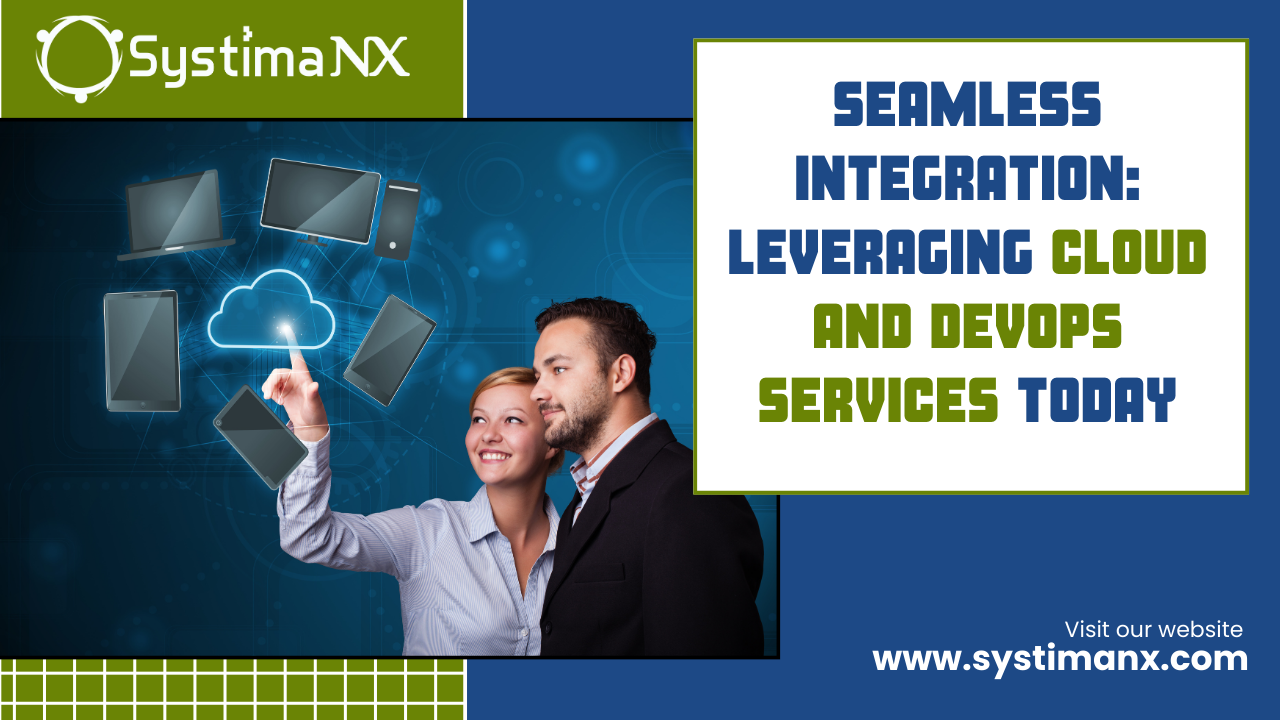From A SystimaNX Research Team perspective
The SystimaNX research team delivers transformative business solutions & digital product development with agility at scale.
Seamless Integration: Leveraging Cloud and DevOps Services Today
DevOps consulting services Cloud strategies

In today's fast-paced digital landscape, businesses are continually seeking ways to enhance efficiency, streamline operations, and deliver superior products and services to their customers. Two key technologies driving this transformation are cloud computing and DevOps practices. When seamlessly integrated, these technologies can revolutionize the way organizations develop, deploy, and manage their software applications.
Cloud Computing:
Cloud computing has become ubiquitous in the business world, offering unparalleled scalability, flexibility, and cost-effectiveness. By leveraging cloud services, organizations can access computing resources on-demand, without the need for large upfront investments in infrastructure. This agility allows businesses to rapidly scale their operations to meet fluctuating demand, reducing time-to-market for new products and services.
DevOps Practices:
DevOps is a set of practices aimed at streamlining the software development process through close collaboration between development and operations teams. By breaking down silos and automating manual tasks, DevOps enables faster delivery of software updates, improved quality, and greater responsiveness to customer feedback. This cultural shift towards continuous integration and continuous delivery (CI/CD) has become essential for staying competitive in today's fast-paced business environment.
Synergy Between Cloud and DevOps:
The synergy between cloud computing and DevOps is undeniable. Cloud platforms provide the ideal infrastructure for implementing DevOps practices, offering a wide range of services for building, deploying, and managing applications. For example, cloud providers like Amazon Web Services (AWS), Microsoft Azure, and Google Cloud Platform (GCP) offer a suite of DevOps tools and services, such as version control, continuous integration, and automated testing.
Automating the Software Delivery Pipeline:
One of the key benefits of integrating cloud and DevOps services is the ability to automate the entire software delivery pipeline. With tools like Jenkins, Travis CI, and CircleCI running on cloud infrastructure, developers can automatically build, test, and deploy their code with every change, ensuring rapid and reliable releases. This automation reduces the risk of human error, accelerates time-to-market, and enables teams to focus on innovation rather than repetitive tasks.
Cloud-Native Architectures:
Cloud-native architectures, such as microservices and serverless computing, align perfectly with DevOps principles. By decomposing monolithic applications into smaller, independent services, organizations can achieve greater agility, scalability, and resilience. Combined with containerization technologies like Docker and orchestration platforms like Kubernetes, cloud-native development enables seamless deployment and management of applications across diverse environments.
Enhanced Visibility and Control:
Another advantage of integrating cloud and DevOps services is improved visibility and control over the software development lifecycle. Cloud-based monitoring and logging tools provide real-time insights into application performance, helping teams identify and address issues before they impact users. By leveraging infrastructure-as-code (IaC) solutions like Terraform and CloudFormation, organizations can provision and manage cloud resources programmatically, ensuring consistency and reproducibility across environments.
Security Considerations:
Security is a critical consideration when leveraging cloud and DevOps services. Cloud providers offer robust security features, such as identity and access management (IAM), encryption, and threat detection, to protect sensitive data and infrastructure. By implementing security best practices, such as code scanning, vulnerability assessments, and compliance monitoring, organizations can mitigate risks and maintain regulatory compliance throughout the software development lifecycle.
Conclusion:
In conclusion, seamless integration of cloud and DevOps services is essential for modern businesses looking to innovate and compete in today's digital economy. By combining the scalability and flexibility of cloud computing with the speed and efficiency of DevOps practices, organizations can accelerate software delivery, improve quality, and enhance customer satisfaction. However, successful integration requires careful planning, collaboration, and a commitment to continuous improvement. With the right strategy and tools in place, businesses can unlock the full potential of cloud and DevOps to drive innovation and achieve their strategic objectives.